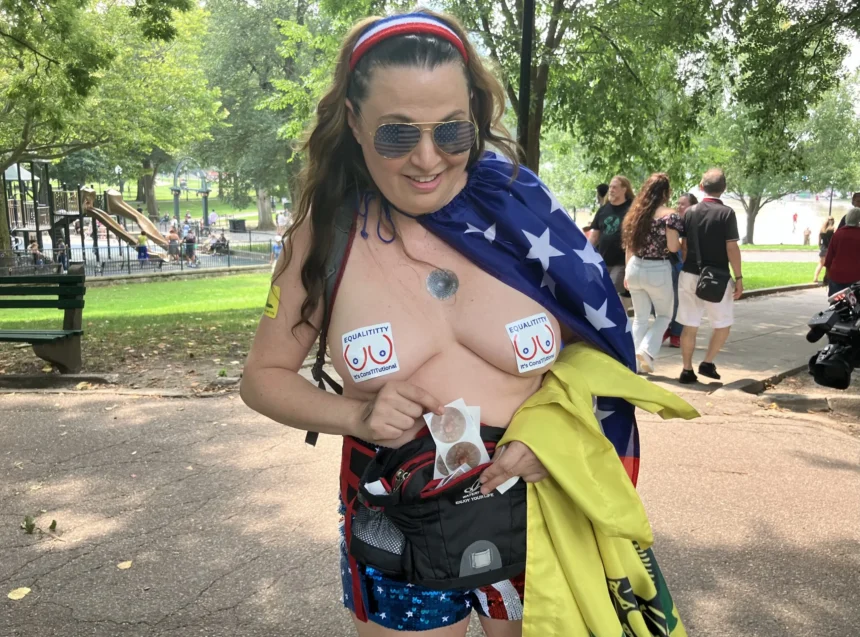As they marched from the winding bronze arms of the Embrace statue on Boston Common up to the golden dome of the State House, a group of topless women implored Massachusetts to “free your breasts; free your mind.”
The Saturday rally, which drew more curious onlookers than the roughly dozen participants, was an effort to bring topless equality to Massachusetts. Organizers with the cheekily named “Equalititty” and GoTopless groups walked about with a simple proposition: In 2024, there isn’t a particularly good reason to bar women from taking their shirts off entirely in the summer heat wherever men are allowed to do the same.
Included under the general category of “crimes against chastity, morality, decency and good order,” Massachusetts law prohibits women from exposing their breasts in public except when breastfeeding. The penalty is up to six months in jail and a $200 fine.
“Because I was coming from France, I have seen topless people all around me,” Nadine Gary, the president of GoTopless, said on The Codcast the day before she took to Beacon Hill sans chemise. “My grandmother went topless. I’ve seen my aunt going topless. It was very, very popular. So I thought, of course, let’s do that, and let’s liberate the United States.”
She and South Shore resident Kasyo Perrier, who helped organize the Boston rally and joined Gary on The Codcast, are followers of the Raëlian religion. Along with believing, broadly speaking, that extraterrestrials created life on earth, Raëlians also say equality of the sexes means equality of expression – see, public toplessness for women.
“It’s very simple,” Perrier said about the focus on toplessness. “It’s to have the same constitutional rights as men to be topless in public.”
In small pockets of Massachusetts, topless beaches are specifically allowed through local ordinance or just considered open secrets. Since Nantucket passed a new bylaw in 2022 allowing anyone to go topless on public beaches – proposed by a seventh-generation Nantucketer and prompting some “uproarious” disagreements according to the Wall Street Journal at the time – local law enforcement says it’s been a “non-issue.”
The Massachusetts law applies to nudity visible in public, not just in a public park. Somewhat exasperated, Perrier points out that “if you simply want to garden in your yard, you’re like, ‘oh, I cannot be topless because it’s not legal for me.’ But you have the man next to you doing his gardening and he can do it topless.”
Though people of all genders are free to go shirtless on Nantucket beaches, Gary notes that there is reluctance to be topless in public even in places like New York, which has technically permitted gender-equal toplessness since 1992. Gary argues that this is because of a set of deeply held religious norms. One woman did follow the group around on Saturday holding a sign citing Genesis and calling for protecting the “dignity of women and the innocence of children.”
The push for topless equality is “also to bring more peace on this planet,” Gary said, attributing certain aggressiveness about female bodies to their concealment. “Because once you are able to show yourself, it means you have certain confidence in your body, loving yourself, and the level of love increases and the level of violence decreases.”
Most of the women who showed up on Saturday, like Equalititty organizer Katrina Brees, focused on the core division in what is classified as acceptable and unacceptable nudity on the basis of gender. It’s not about religion, or sexual display, or a desire to show off nudity in public generally, they said. It’s about law.
“We’re not just here to ‘flap our tits’ around Boston, as my dad’s friends would say,” Brees told those gathered near the State House. “We are here to make our legislators 100 percent aware that we are ready for equality and the law must reflect that.”
In the new legislative term, she said, there will be a bill put forward – possibly through a citizen petition – to “decriminalize the female human breast.”
As social media sites like Facebook and Instagram – both owned by company Meta – demonstrate, even general bans on showing topless women isn’t a clear-cut practice to enforce or explain. Meta’s oversight board, which advises the company on its content moderation, last year recommended changing its adult nudity guidelines to reflect international standards and account for trans or intersex people rather than try to algorithmically enforce “a binary view of gender and a distinction between male and female bodies” at massive scale.
Draped in an American flag, with Equalititty stickers over the center of her breasts, Brees also handed out stickers with photos of nipples on them that could be placed, with no small amount of irony, over an actual nipple. During protests online and off, using scans of male chests as makeshift bikini tops or stickers, serves to highlight the visual indistinguishability of the two.
In a hushed, joking tone, Brees admitted that some of the sticker pictures were of her and some were her mailman’s chest. When she asked her mailman, his girlfriend “was like, ‘I don’t know about that,’” Brees said, laughing, “and then I was like, ‘tell her it’s for civil rights, doesn’t your girlfriend like civil rights?’”
This article first appeared on CommonWealth Beacon and is republished here under a Creative Commons license.
GET THE MORNING HEADLINES DELIVERED TO YOUR INBOX











